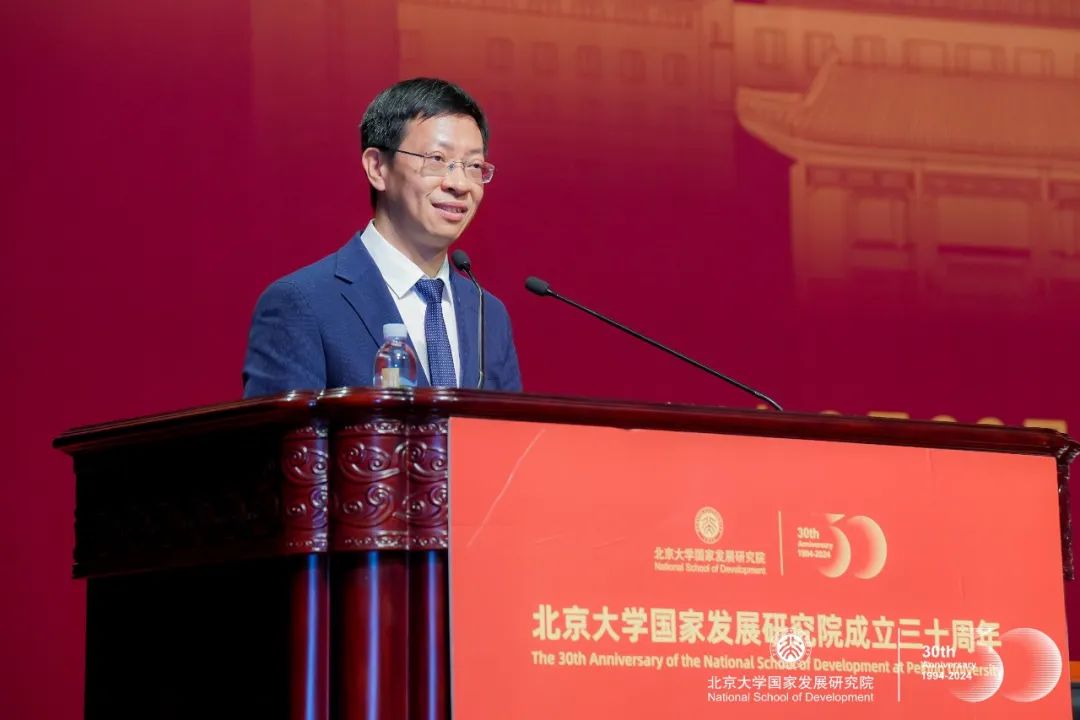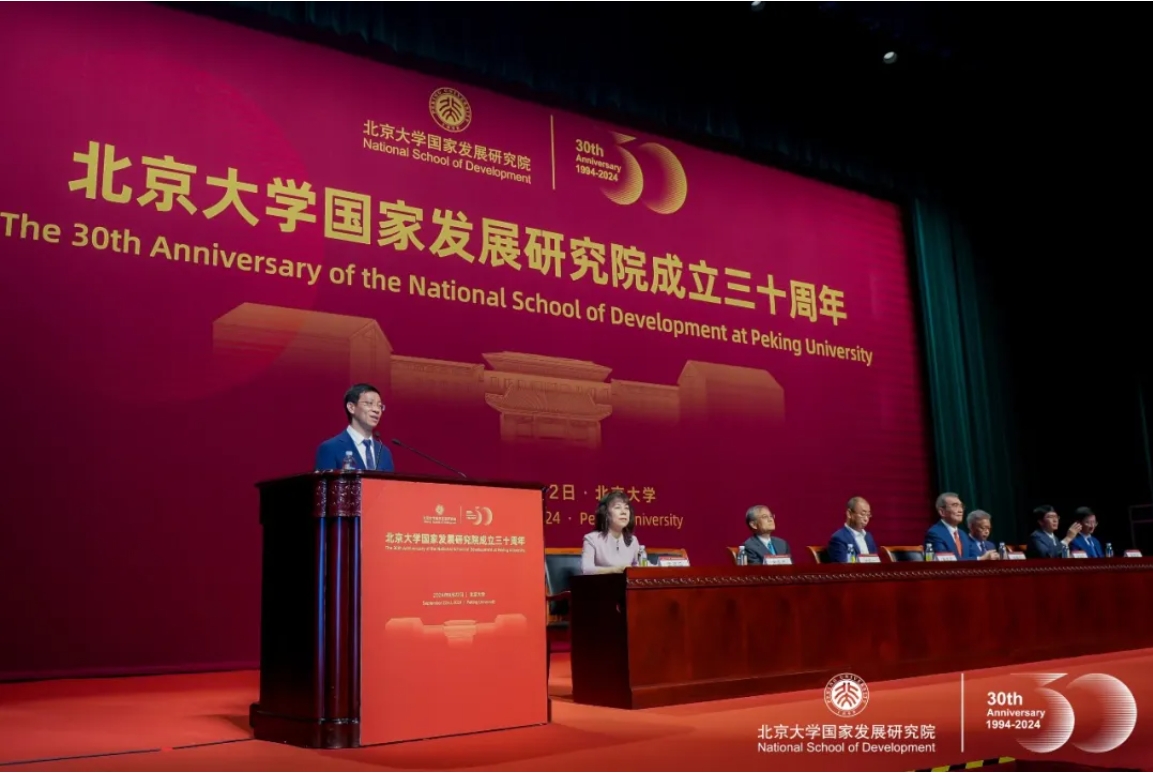Recently, the official WeChat account of the National School of Development (NSD) at Peking University (PKU) reported on the speech given by President Yu Miaojie at the 30th anniversary celebration of the school. Below is the original text.

On September 22, 2024, the 30th anniversary celebration of the National School of Development at Peking University was held at the Centennial Hall. The following is the speech content based on the address by Professor Yu Miaojie, President of Liaoning University, Fellow of the International Economic Association, and former Party Secretary and Deputy Dean of the National School of Development at Peking University.

“Dear leaders, esteemed faculty, fellow students, and alumni:
Good morning to everyone! I sincerely thank Dean Huang Yiping and Secretary Lei Xiaoyan for their warm invitation, allowing me to return to the National School of Development on this significant day. At this important moment, I would like to use four words to express my birthday wishes to the National School of Development.
1. Congratulations
Congratulations to the National School of Development for its outstanding and even irreplaceable contributions to education in China, particularly in the field of economics education, over the past thirty years. What are the standards or missions of a good school or a good college? In my opinion, there are five key points, and the National School of Development has excelled in all of them.
First is moral education. The National School of Development nurtures approximately a thousand students each year. Although the scale was smaller in the early years, it has produced more than twenty thousand alumni over the past thirty years. These alumni are now leaders in various fields and play a significant role in China’s economic development and the advancement of economics education in China. For example, in our Ph.D. program in Economics, the quality of the doctoral students is very high, and they are synonymous with being ‘reliable’ and ‘outstanding’ in academia.
Second is scientific research. Faculty and students at the National School of Development have published numerous influential and highly cited papers in top journals both domestically and internationally. Many of the faculty’s works have become classics in the study of the Chinese economy. For instance, Professor Lin’s book, The Miracle of China’s Economy, is one of the essential readings for studying the Chinese economy.
Third is think tank development. The construction of think tanks relies on two pillars: providing policy advice and enlightening the public. The National School of Development is one of the first 25 high-end think tanks recognized by the country. Many of the policy recommendations made by the faculty have been adopted by the central government, significantly contributing to the advancement of China’s economic and social development. Meanwhile, the school promotes public discourse through the publication of newsletters and hosting lectures and forums, helping to popularize knowledge in economics, management, and other disciplines. It has had a tremendous impact on various aspects of society, truly achieving the ideal of ‘bringing the emperors Yao and Shun to power and fostering a refined culture’.
Fourth is social impact. For a long time, every faculty member at the National School of Development has been attentive to real economic issues in China within their research areas. For example, Professor Lin’s research on building a New Socialist Countryside, Professor Zhou Qiren’s research on telecommunications reform, Governor Yi Gang and Dean Huang Yiping’s research on building a strong financial nation, Professor Hai Wen’s research on China’s accession to the WTO, Professor Zhang Weiying’s research on state-owned enterprise reform and entrepreneurship, Professor Lu Feng’s research on trade in the industrial chain, as well as research by Professors Zeng Yi, Zhao Yaohui, and Lei Xiaoyan on population and health aging, and Professors Li Ling and Liu Guo-En on healthcare reform and health development, and Professor Zhang Fan’s research on Sino-American relations, and Professor Chen Ping’s research on grand historical patterns, just to name a few. Their diverse work provides intellectual support for the promotion of China’s economic development. This reminds me of what I said at the graduation speech at Liaoning University: ‘Having recognized the vast world, I still cherish the greenery of the grass and trees’. The research undertaken by the faculty at the National School of Development reflects their concern for people’s livelihoods and their earnest hopes for national rejuvenation.
Fifth is international exchange. Under the leadership of Dean Lin, the Institute of South-South Cooperation and Development has nurtured a large group of foreign elites who are friendly towards China. We have actively practiced the beautiful vision articulated by the General Secretary of ‘letting a hundred flowers bloom and a hundred schools of thought contend’.
Over the past three decades, the National School of Development has set a model in the five aspects above, which is truly commendable. As a former faculty member of the National School of Development and an alumnus of Peking University, allow me to express my deepest respect to each and every teacher at the National School of Development.

2. Gratitude
In 2006, I was recruited by Professor Lin to work at the National School of Development, and I left Peking University in 2022. Throughout these sixteen years, every step of my growth has been supported by the cultivation, care, guidance, and assistance of every teacher at the National School of Development. Due to time constraints, I cannot list everyone, but I would like to mention at least four professors. I am particularly grateful to Professor Lin, who provided me with extensive guidance and advice on academic writing and how to effectively tell the Chinese story and voice China’s perspectives when I first joined the National School of Development. I have greatly benefited from his insights for a lifetime. I am also deeply thankful to Professor Zhou Qiren, from whom I learned how to research real economic issues. My heartfelt gratitude goes to Professor Hu Dayuan, who taught me about upholding integrity and innovation through the story of Langrun Garden and how to carry on the legacy. Finally, I would like to express my special thanks to the administrative team led by Professor Xing Huiqing. During my sixteen years at the National School of Development, my life has greatly benefited from the tremendous support of Professor Xing’s team.
3. Being Grateful
I am deeply grateful to live in this best era of the past five thousand years. Even more so, I am thankful to have encountered this group of the most wonderful teachers at the National School of Development. It is their support that has enabled each of us here to become a better version of ourselves.
At the National School of Development, students acquire knowledge that allows us to carry on the teachings of our predecessors. More importantly, we learn a concept and a spirit that emphasizes the desire to establish a heart for the world and a mission for the people. With this original intention, we achieve the unity of knowledge and action, researching the real world and engaging with it to make a difference. By maintaining this commitment, each of us can contribute our modest strength to the modernization of China.
4. Best Wishes
There is an old Chinese saying, ‘One should be established by the age of thirty’, so thirty is a wonderful age. Wishing the National School of Development at Peking University to continue its youthful and vigorous commitment, its unstoppable momentum, and to create even greater achievements in the next thirty years, making even more significant contributions to China’s education and national development.
At the same time, I wish each faculty member at the National School of Development good health and good fortune. For everyone present, may your future be boundless and your dreams come true.”
